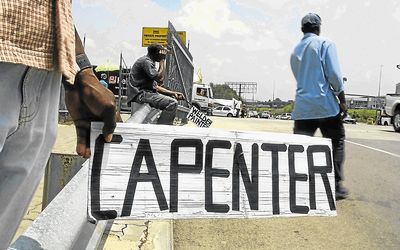JOB creation in agriculture, manufacturing, and the wholesale and retail trade will remain under pressure in the second quarter, as employers look to contain costs and keep their operations afloat.
This is further bad news for SA’s stagnating economy, which has been unable to shake off double-digit unemployment. Statistics SA data show that the official unemployment figure stands at 24%, or about 5.2-million people.
The job-creation sentiment is reflected in the results of the Manpower employment outlook report released on Monday. The survey collates the views of 752 employers about their hiring plans.
Agriculture plunged 14% in the fourth quarter last year, shaved 0.3 percentage points from economic growth in that quarter, and is still reeling from the effects of one of the worst droughts in decades.
However, the survey results show that employers in the electricity, gas and water-supply sector, as well as finance, insurance, real estate and business services are likely to generate employment.
A total 13% of respondents plan to hire more people, 8% are looking at retrenching staff, while the rest will keep numbers unchanged.
Manpower SA MD Lyndy van den Barselaar said: "The weak rand has had a negative impact on many businesses across sectors. Increased operating and import costs, paired with the rising costs of necessities and the falling price of commodities, mean that businesses do not have the budget to hire new talent in the coming quarter."
Francois van der Merwe, Novare’s head of offshore investments, said the fact that the majority of employers surveyed wanted to keep staffing levels unchanged was indicative of the uncertainty surrounding the economic outlook, as well as the effects of higher inflation and rising interest rates.
The poor job-creation outlook is also a reflection of the extent to which companies are battling in a tough operating environment.
In addition, the South African Chamber of Commerce and Industry, which represents 20,000 businesses, said it was concerned that the effects of the drought would extend beyond agriculture.
"Given that other sectors utilise about 60% of agricultural output as intermediary inputs, the impact on secondary industries’ output and prices will be felt throughout 2016 and beyond," it said.
The rising cost of doing business, the weak rand and under-pressure commodity prices had driven businesses and entrepreneurs into the arms of those in finance, insurance, real estate and services, Ms van den Barselaar said. This, in part, explained the positive jobs outlook in those sectors of the economy.
Mining, where thousands of jobs are expected to be slashed this year, is also expected to create jobs in the second quarter.
"As mining and quarrying continue to focus on more sustainable and responsible methods, this creates opportunities for new employment, especially for consultants who specialise in sustainability and environmental conservation," Ms van den Barselaar said.
However, the country is not alone in its poor jobs outlook — the same survey was conducted globally and its results mirrored SA’s. Hiring confidence was strongest in India, Japan and Taiwan, while it was weakest in France, Italy and Brazil.

WORKERS WITHOUT WORK: Desperate for jobs yet with little hope of securing one, the workers of SA are taking their plight into their own hands and are expecting answers as municipal elections approach. Picture: SUPPLIED
JOB creation in agriculture, manufacturing, and the wholesale and retail trade will remain under pressure in the second quarter, as employers look to contain costs and keep their operations afloat.
This is further bad news for SA’s stagnating economy, which has been unable to shake off double-digit unemployment. Statistics SA data show that the official unemployment figure stands at 24%, or about 5.2-million people.
The job-creation sentiment is reflected in the results of the Manpower employment outlook report released on Monday. The survey collates the views of 752 employers about their hiring plans.
Agriculture plunged 14% in the fourth quarter last year, shaved 0.3 percentage points from economic growth in that quarter, and is still reeling from the effects of one of the worst droughts in decades.
However, the survey results show that employers in the electricity, gas and water-supply sector, as well as finance, insurance, real estate and business services are likely to generate employment.
A total 13% of respondents plan to hire more people, 8% are looking at retrenching staff, while the rest will keep numbers unchanged.
Manpower SA MD Lyndy van den Barselaar said: "The weak rand has had a negative impact on many businesses across sectors. Increased operating and import costs, paired with the rising costs of necessities and the falling price of commodities, mean that businesses do not have the budget to hire new talent in the coming quarter."
Francois van der Merwe, Novare’s head of offshore investments, said the fact that the majority of employers surveyed wanted to keep staffing levels unchanged was indicative of the uncertainty surrounding the economic outlook, as well as the effects of higher inflation and rising interest rates.
The poor job-creation outlook is also a reflection of the extent to which companies are battling in a tough operating environment.
In addition, the South African Chamber of Commerce and Industry, which represents 20,000 businesses, said it was concerned that the effects of the drought would extend beyond agriculture.
"Given that other sectors utilise about 60% of agricultural output as intermediary inputs, the impact on secondary industries’ output and prices will be felt throughout 2016 and beyond," it said.
The rising cost of doing business, the weak rand and under-pressure commodity prices had driven businesses and entrepreneurs into the arms of those in finance, insurance, real estate and services, Ms van den Barselaar said. This, in part, explained the positive jobs outlook in those sectors of the economy.
Mining, where thousands of jobs are expected to be slashed this year, is also expected to create jobs in the second quarter.
"As mining and quarrying continue to focus on more sustainable and responsible methods, this creates opportunities for new employment, especially for consultants who specialise in sustainability and environmental conservation," Ms van den Barselaar said.
However, the country is not alone in its poor jobs outlook — the same survey was conducted globally and its results mirrored SA’s. Hiring confidence was strongest in India, Japan and Taiwan, while it was weakest in France, Italy and Brazil.
























Change: -0.47%
Change: -0.57%
Change: -1.76%
Change: -0.34%
Change: 0.02%
Data supplied by Profile Data
Change: -1.49%
Change: 0.07%
Change: -0.47%
Change: 0.00%
Change: 0.04%
Data supplied by Profile Data
Change: 0.47%
Change: 1.18%
Change: 0.62%
Change: 0.07%
Change: 1.29%
Data supplied by Profile Data
Change: 0.21%
Change: -0.32%
Change: 0.20%
Change: -1.22%
Change: -0.87%
Data supplied by Profile Data